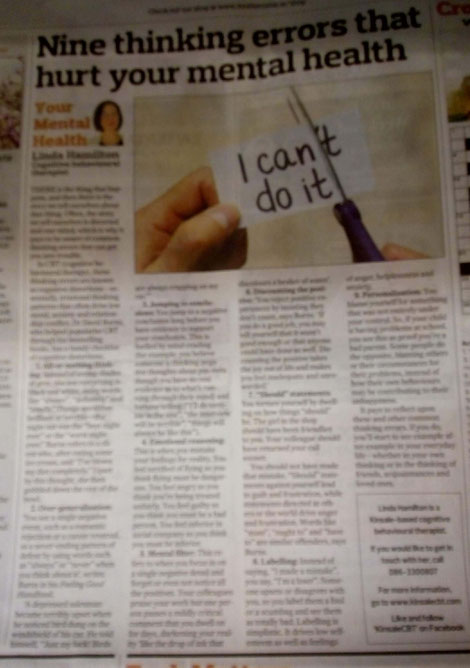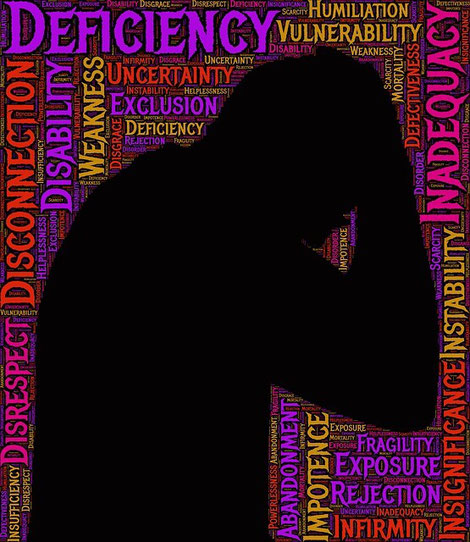
In CBT, thinking errors are known as cognitive distortions – essentially, unhelpful thinking patterns that often drive low mood, anxiety and relationship conflict. In last week's Southern Star, I explored how it pays to be aware of common thinking errors that can hurt your mental health. The column is reproduced below.
There is the thing that happens, and then there is the story we tell ourselves about that thing. Often, the story we tell ourselves is distorted and one-sided, which is why it pays to be aware of common thinking errors that can get you into trouble.
In CBT (cognitive behavioural therapy), these thinking errors are known as cognitive distortions – essentially, irrational thinking patterns that often drive low mood, anxiety and relationship conflict. Dr David Burns, who helped popularise CBT through his bestselling books, has a handy checklist of cognitive distortions.
1 – All-or-nothing thinking: Instead of seeing shades of grey, you see everything in black and white, using words like “always”, “definitely” and “totally”. Things are either brilliant or terrible – the night out was the “best night ever” or the “worst night ever”.Burns refers to a client who, after eating some ice cream, said “I’ve blown my diet completely”. Upset by this thought, she then gobbled down the rest of the bowl.
2 – Over-generalization: ‘You see a single negative event, such as a romantic rejection or a career reversal, as a never-ending pattern of defeat by using words such as “always” or “never” when you think about it’, writes Burns in his Feeling Good Handbook. ‘A depressed salesman became terribly upset when he noticed bird dung on the windshield of his car. He told himself, “Just my luck! Birds are always crapping on my car.”’
3 – Jumping to conclusions: You jump to a negative conclusion long before you have evidence to support your conclusion. This is fuelled by mind-reading (for example, you believe someone is thinking negative thoughts about you even though you have no real evidence as to what’s running through their mind) and fortune-telling (“I’ll do terrible in the test”, “the interview will be terrible”, “things will always be like this).
4 – Emotional reasoning: This is when you mistake your feelings for reality. You feel terrified of flying so you think flying must be dangerous. You feel angry so you think you’re being treated unfairly. You feel guilty so you think you must be a bad person. You feel inferior in social company so you think you must be inferior.
5 – Mental filter: This refers to when you focus in on a single negative detail and forget or even not notice all the positives. Your colleagues praise your work but one person passes a mildly critical comment that you dwell on for days, darkening your reality ‘like the drop of ink that discolours a beaker of water’.
'TAKES THE JOY OUT OF LIFE'

6 – Discounting the positive: ‘You reject positive experiences by insisting they ‘don't count’, says Burns. ‘If you do a good job, you may tell yourself that it wasn’t good enough or that anyone could have done as well. Discounting the positive takes the joy out of life and makes you feel inadequate and unrewarded’.
7 – “Should” statements: You torture yourself by dwelling on how things “should” be. The girl in the shop should have been friendlier to you. Your colleague should have returned your call sooner. You should not have made that mistake.“Should” statements against yourself lead to guilt and frustration, while statements directed at others or the world drive anger and frustration.Words like “must”, “ought to” and “have to” are similar offenders, says Burns.
8 – Labelling: Instead of saying, “I made a mistake”, you say, “I’m a loser”. Someone upsets or disagrees with you, so you label them a fool or a scumbag and see them as totally bad. Labelling is simplistic. It drives low self-esteem as well as feelings of anger, helplessness and anxiety.
9 – Personalisation: You blame yourself for something that was not entirely under your control. So, if your child is having problems at school, you see this as proof you’re a bad parent. Some people do the opposite, blaming others or their circumstances for their problems, instead of how their own behaviours may be contributing to their unhappiness.
It pays to reflect upon these and other common thinking errors. If you do, you’ll start to see example after example in your everyday life – whether in your own thinking or in the thinking of friends, acquaintances and loved ones.